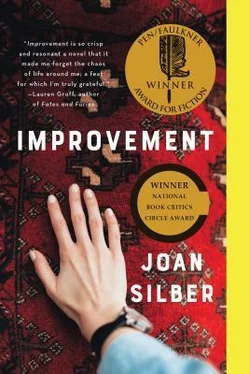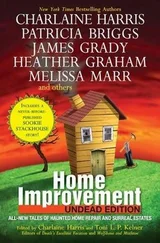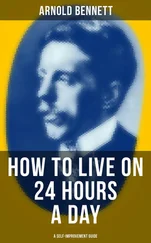Darisse knew that things fell apart, nothing lasted forever; she knew this better than most people bothered to. Her working life was all about natural decay—she worked for a hospice service as a home health aide, washing, watching, spooning, combing, cleaning as people got worse. Everyone always wanted to know how she could stand to do it. But it was much better than a lot of other crap people did. She did it with respect; she got respect. A lot of jobs nobody really needed you to do.
Claude said, “All the old men, don’t they try to grope you? I would. You bet.” Darisse said they only sent her out to ladies and they weren’t all old either. She gave them sponge baths in bed; she knew all their crevices and sores and sadness of flesh. Everybody had bodies; she wasn’t afraid of bodies. Not with Claude either. His sleek sweet shape, his speedy impulses and wild susceptibility. But now he’d met someone else he liked better. That was what her friends said.
Darisse’s grandmother was not happy when she got home so late that night. She woke up when Darisse came in and stood in the hallway of the apartment, with her hair all crazy and her eyes puffed into squints. “You could get yourself killed,” she said, “wandering around at this hour. Get murdered by me for waking me up.” She turned and went back to her room.
Darisse had a number of reasons for not wanting to get on her bad side. Even on good days, her grandmother was grouchy and hard to deal with, but she loved Darisse and hadn’t hesitated all that long when Darisse turned up out of the blue asking for a place to stay. But she’d put her foot down about taking in any kids as well. Anybody know how many babies she’d raised? No more babies in the house. New rule, spread the word. So most of the time Darisse’s two-year-old, Jeshauna, was with Lionel’s mother. She got decent care, but Lionel, Darisse’s ex, was the gatekeeper. He got to decide when Darisse saw her and when she didn’t, and he had his ways of deciding.
When Darisse woke up the next day, her grandmother was already in church. Darisse didn’t do church (that was her right), but when she checked her phone and there was nothing on it, she wanted to pray: Send me Claude . You could wish; it wasn’t hypocrisy to wish.
In her miserable, no-good jalopy that ate up too much gas, she drove to the motel where Claude and his boys always stayed. The car they liked so much, the silver Taurus, wasn’t there. She went to the desk and said, “I’d just like to leave a message,” and she gave them Wiley’s name. They used his name for bookings because he had the driver’s license. No such gentleman was registered.
“What, are you stalking them now?” her friend Frances said. “Let it go. He turns up, let him talk. But forget it for now.”
Darisse saw the practicality in this but she knew what she knew about Claude. He didn’t have real secrets but he had a different nature than people thought. He was saving up to rent his sister a whole salon for her business. He was going to buy her—Darisse—a set of gold earrings as big as Hula-Hoops. He’d never met Jeshauna but when he came to Richmond the time before last he brought a tiny electric piano for her. She liked it too; she banged on it like a little lunatic.
Amanda, who was Darisse’s current hospice patient, said a two-year-old was too young for electric toys, but Darisse said, “I watch her. Most people don’t trouble themselves to watch their kids.”
“You’re a good mother,” Amanda said, in her whooshy voice. She thought Jeshauna lived with her, and Darisse didn’t say otherwise.
Amanda was forty-seven, with advanced lung cancer and no children (hence the need for Darisse). There was a husband who came in at night, a paunchy guy with a blond goatee, very nice. He was a maintenance supervisor at the university, where Amanda had been a secretary. They lived in tract housing, on a lane of ranch-style homes that looked like motel units, beyond the outskirts of the city. Amanda was local; her father had once worked in a Philip Morris factory.
Claude, carrier of trunkfuls of Marlboros, Newports, Parliaments, and even Basics, didn’t smoke himself, never had. Amanda, who breathed with the help of a machine more and more of the time, said she still had dreams of lighting up a cigarette and was very disappointed to wake up without one. She hated the tobacco companies, who were glad to kill her for a profit—hate was not even the word. But most people were no better than that if you wagged a dollar at them. “Not you,” she said. “You don’t make money.”
This was true. Darisse got only a fraction of what the agency charged for her. But she got as much work as she wanted; people asked for Darisse, they wrote letters saying she was an angel on earth, they told friends to make sure they got her and no one else. For what she did, she was doing okay. When someone like Claude came along (actually no one like him had come before), she was thrilled by the gifts and the promises—who wouldn’t be?—and she naturally started thinking about what being with him more might mean. If she had a chunk of money in her hand, she could get Lionel to give her Jeshauna back. Might not take that much. And Claude always said, “No nickel-and-diming when you with me.” Had said. She’d heard him say it but it was becoming very much like something she’d made up.
She checked Claude’s Facebook page, which he hadn’t done anything to for a year. There was an old photo of a birthday party, a slinky woman in a T-shirt with CLAUDE spelled out in lights (didn’t the shirt get hot?). He’d shown her those photos. If Darisse could remember the sister’s name, maybe she could find her.
All people had names, but theirs was Johnson. No good searching for that one. And how could the Internet bring him to her, if he wasn’t showing up on his own two feet? She had no luck remembering Maxwell’s full name, but Wiley had the world’s most asinine picture on Facebook, his face twisted up like a drunk monster. Darisse asked to friend him.
If Claude was in police custody, if he was in the hospital, wouldn’t his name show up in a newspaper? Not in the Richmond Times-Dispatch , not in the Richmond Free Press either. Not on Google. She was doing what she could, not just waiting, working her smartphone harder than it wanted to work. Who did he think he was? She talked to him in her mind. You can stop messing with me. You can tell me. Whatever it is. Hurry up .
A person can check her phone only so many times. Day after day. The worst part was at the end of the week when she called and the mechanical voice answered at once, without ringing first. Sign of a used-up battery. Maybe he had a new phone now. Maybe he was in another city. She was still here and he knew goddamn well where she was.
At the end of the second week something changed in her. She understood very well that when you took a good look under a clear, hard light, the world was a fucked-up hellhole. Most people knew this, she’d known this, but nobody wanted to think about it all the time. It didn’t pay to forget for too long.
At work she wasn’t any different. She laughed when Amanda made her usual crack, “The way my health is, don’t go buying me any unripe bananas.” Amanda was repeating it for the benefit of a new nurse, who’d come to check the equipment. The nurse said, “Oh, you can buy a few pounds. You’ve got more time.” The nurse was a guy in his thirties, short and sober-faced, with a shaved head (how many black men still thought that was sexy?). There were more male nurses now, and they weren’t all gay either.
Darisse thought Amanda had a few months more, and she was often (but not always) right. So far Amanda only needed morphine at night, when her husband could shoot one of those teeny syringes in her mouth. Darisse wasn’t allowed. “He was scared the first time,” Amanda said, “but then he got the hang of it.” People had to get used to things or else. Darisse had seen else and did not think well of it.
Читать дальше












